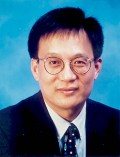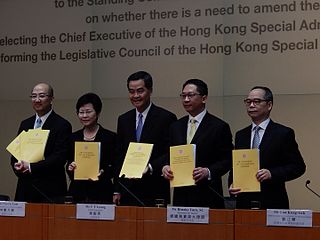
The chief executiveof the Hong Kong Special Administrative Region is the representative of the Hong Kong Special Administrative Region and head of the Government of Hong Kong.

The Legislative Council of the Hong Kong Special Administrative Region, colloquially known as LegCo, is the unicameral legislature of Hong Kong. It sits under China's "one country, two systems" constitutional arrangement, and is the power centre of Hong Kong's hybrid representative democracy, though popular representation in the legislature has diminished significantly in recent years, along with its political diversity.

The 2004 Hong Kong Legislative Council election was held on 12 September 2004 for members of the Legislative Council of Hong Kong (LegCo). The election returned 30 members from directly elected geographical constituencies and 30 members from functional constituencies, of which 11 were unopposed.

In the political systems of Hong Kong, a functional constituency is a professional or special interest group involved in the electoral process. Eligible voters in a functional constituency may include natural persons as well as other designated legal entities such as organisations and corporations.

Basic Law Article 45 Concern Group was a pro-democracy political group in the Hong Kong Special Administrative Region of the People's Republic of China (HKSAR). It was established on 14 November 2003 by legal practitioners and academics. It had four seats in the Legislative Council of Hong Kong before it transformed into the Civic Party in 2006.

Article 45 is an article of the Hong Kong Basic Law. It states that the Chief Executive should be chosen by universal suffrage upon nomination by a broadly representative nominating committee as an eventual goal.

Elections in Hong Kong take place when certain political offices in the government need to be filled. Hong Kong has a multi-party system, with numerous parties in the Legislative Council. The Chief Executive of Hong Kong is nonpartisan but can work with several parties to form a coalition government.

Legislative elections are held in Hong Kong every four years Legislative Council (LegCo) in accordance with Article 69 of the Basic Law. Legislative elections are held either at the expiry of a four-year term or when the Chief Executive dissolves the legislature and calls a new election.

Maria Tam Wai-chu is a senior Hong Kong politician and lawyer. She is a member of the Committee for the Basic Law of the National People's Congress Standing Committee (NPCSC) since 1997 and the chairman of the Operations Review Committee of the Independent Commission Against Corruption (ICAC) since 2015.

On 4 December 2005, tens of thousands of people in Hong Kong protested for democracy and called on the Government to allow universal and equal suffrage. The protesters demanded the right to directly elect the Chief Executive and all the seats of the Legislative Council. They also urged the government to abolish the appointed seats of the district councils, in response to the limitations of the government's reform proposal.

Democratic reforms in Hong Kong did not seriously begin until 1984 and has faced significant challenges since 2014. The one country, two systems principle allows Hong Kong to enjoy high autonomy in all areas besides foreign relations and defence, which are responsibilities of the central government. Hong Kong's Basic Law allows residents to vote for local district councillors.

The 2010 Hong Kong Legislative Council by-election was an election held on 16 May 2010 in Hong Kong for all five geographical constituencies of the Legislative Council (LegCo), triggered by the resignation of five pan-democrat Legislative Councillors in January of the same year.

The Constitutional and Mainland Affairs Bureau is a ministerial-level policy bureaux of the Government of Hong Kong responsible for the implementation of the Basic Law, including electoral matters and promotion of equal opportunities and privacy protection. The bureau also functions as the intermediary between the HKSAR Government and the Central People's Government and other Mainland authorities under the principles of "One Country, Two Systems", including the coordination of liaison between the HKSAR Government and Central authorities, promoting regional co-operation initiatives between Hong Kong and the Mainland, and overseeing the operation of offices of the HKSAR Government on the Mainland.
The 2010 Hong Kong electoral reform was the series of events began in 2009 and finalised in 2010 under the Consultation Document on the Methods for Selecting the Chief Executive and for Forming the Legislative Council in 2012, a document published on 18 November 2009 by the Government of Hong Kong to broaden the scope of political participation and increase the democratic elements in the 2012 elections in line with the Hong Kong Basic Law.

The Alliance for True Democracy was a coalition of the pan-democrats to fight for full universal suffrage in Hong Kong.

The 2014–2015 Hong Kong electoral reform was a proposed reform for the 2017 Hong Kong Chief Executive election and 2016 Legislative Council election.
Qiao Xiaoyang is the former chairman of the Hong Kong SAR Basic Law Committee of the 11th National People's Congress.
The 2005 Hong Kong electoral reform was carried out in late 2005 for the selection of the Chief Executive of Hong Kong (CE) in 2007 and Legislative Council of Hong Kong (LegCo) in 2008. The reform proposals were ultimately voted down by the pro-democracy camp.
The Decision of the Standing Committee of the National People's Congress on Issues Relating to the Selection of the Chief Executive of the Hong Kong Special Administrative Region by Universal Suffrage and on the Method for Forming the Legislative Council of the Hong Kong Special Administrative Region in the Year 2016, commonly known as the 31 August Decision, is a decision made by the Standing Committee of the National People's Congress (NPCSC), the national legislative body of the People's Republic of China (PRC) on 31 August 2014 which set limits for the 2017 Chief Executive election and 2016 Legislative Council election in the Hong Kong Special Administrative Region (HKSAR).

The 2021 Hong Kong electoral changes were initiated by the National People's Congress (NPC) on 11 March 2021 to "amend electoral rules and improve the electoral system" of the Hong Kong Special Administrative Region (HKSAR) for its Chief Executive (CE) and the Legislative Council (LegCo), in order to ensure a system in which only "patriots", according to the Chinese definition, govern Hong Kong. The reforms have been widely criticized for their negative impact on the democratic representation in the Hong Kong legislature.











